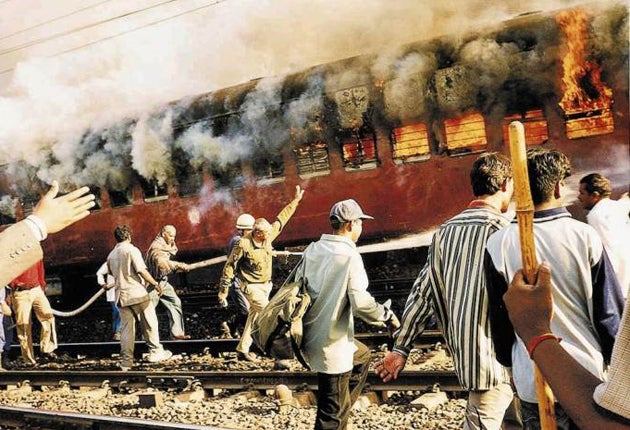Arson verdict revives bitter conflict over train deaths that sparked riots
Muslim mob blamed for fire that incited Indian unrest killing 1,

Your support helps us to tell the story
From reproductive rights to climate change to Big Tech, The Independent is on the ground when the story is developing. Whether it's investigating the financials of Elon Musk's pro-Trump PAC or producing our latest documentary, 'The A Word', which shines a light on the American women fighting for reproductive rights, we know how important it is to parse out the facts from the messaging.
At such a critical moment in US history, we need reporters on the ground. Your donation allows us to keep sending journalists to speak to both sides of the story.
The Independent is trusted by Americans across the entire political spectrum. And unlike many other quality news outlets, we choose not to lock Americans out of our reporting and analysis with paywalls. We believe quality journalism should be available to everyone, paid for by those who can afford it.
Your support makes all the difference.The dispute surrounding one of the most controversial incidents in recent Indian history has been reopened after a court ruled that a fire that tore through a railway carriage and killed dozens of Hindu pilgrims was started by a Muslim mob and was not the result of an accident. The blaze on the train nine years ago was the trigger for rampaging communal violence in which hundreds of Muslims were subsequently attacked and killed.
A special court in the western state of Gujarat yesterday found 31 people guilty of being part of a conspiracy to set fire to a carriage of the Sabarmati Express as it was waiting in the town of Godhra in February 2002.
Most of the 60 people who died were Hindu activists. As news of the deaths spread, Hindu mobs embarked on revenge attacks on Muslims in locations across Gujarat that resulted in the death of more than 1,000 people. The state's chief minister, Narendra Modi, was accused of allowing the attacks to take place and of stoking religious hatred.
In the aftermath of the train fire, around 100 Muslims were arrested and charged. But the case was stalled as a result of a series of separate inquiries, at least one of which concluded that the blaze was started by a cooking fire.
The court in yesterday's hearing, which also found more than 60 of the accused not guilty, including the alleged ringleader, will deliver its sentence on Friday.
After the verdict was announced, special public prosecutor JM Panchal claimed the ruling would put an end to the dispute over the cause of the fire. "The motive of conspiracy was to set the train on fire," he said. "There can be no debate on the judicial verdict. The verdict is based on oral evidence and eyewitness accounts."
But that is unlikely. While a 2008 inquiry by the state authorities also concluded the fire had been started deliberately, an earlier federal inquiry into the blaze ruled that it was most likely the result of an accident in the train's kitchen. Other unofficial investigations into the fire suggested that while it was started deliberately, there had been no pre-planning.
"This controversy is not going to go away," said Mujibur Rehman, a professor of political science at Delhi's Jamia Millia University. "The 31 people who have been convicted will appeal against the verdict while the authorities will probably appeal against the decision to acquit the 60 who walked away. Also, there has been so much politicisation of this issue that it has affected the credibility of the court."
The arson attack on the train was inextricably linked with two other deeply controversial incidents of inter-religious violence. Most of the activists who were killed aboard the Sabarmati Express had been returning from a ceremony organised by a right-wing religious group at the Ayodhya temple in the state of Bihar, where a Muslim mosque had been torn down by Hindus 10 years earlier.
In the weeks following the Sabarmati blaze, Muslims were assaulted and killed in revenge attacks that marked perhaps the worst religious violence in India since Partition.
The train fire is one of nine incidents relating to religious violence that the special court has been tasked with investigating. Security was stepped up ahead of the ruling.
Mr Modi has been questioned in camera by investigators appointed by the country's highest court. He has always denied accusations that he or ministers in his Bharatiya Janata Party (BJP) government either stoked the tension following the fire or deliberately failed to protect Muslims in up to 1,000 towns and villages where violence broke out.
The verdict has received a mixed response. Shanti Bhushan, a senior Supreme Court lawyer and activist, said the decision was a "travesty of justice". "I understand most of the 63 persons let off today were denied bail and spent all these years behind bars," he said. "Who will compensate for the loss of their valuable years of life?"
But the BJP, which controls Gujarat, welcomed the verdict. "Certainly, there has been a degree of assurance that law and justice has prevailed," said spokesman Ravishankar Prasad.
Years of rage
December 1992 The Babri mosque in Ayodhya is destroyed by radical Hindus who want a temple in its place. The destruction triggers Hindu-Muslim riots in which more than 2,000 people die.
February 2002 Dozens of Hindu pilgrims are killed on a train while returning from Ayodhya. News of the death sparks riots which see 1,000 Muslims killed.
2005 An inquiry concludes that the fire was accidental. Three years later, a state inquiry says it was started deliberately.
February 2011 Thirty-one Muslims are convicted of conspiracy to set fire to a carriage of the train.
Join our commenting forum
Join thought-provoking conversations, follow other Independent readers and see their replies
Comments